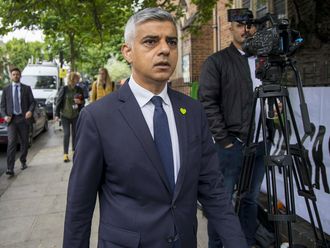London: Michael Gove, the education secretary, has seized on a finding by Ofsted that a “culture of fear and intimidation” existed in some Birmingham schools by announcing that the government will require all 20,000 primary and secondary schools to “promote British values”.
These values will include the primacy of British civil and criminal law, religious tolerance and opposition to gender segregation. Gove also suggested girls wearing the burqa would struggle to find their voice, and must not feel silenced in the classroom.
In what is being described by ministers as a decisive shift away from moral relativism in the classroom, the education secretary took action after a landmark series of reports by the schools inspectorate into 21 Birmingham secular schools found an atmosphere of intimidation, a narrow, faith-based ideology, manipulation of staff appointments and inappropriate use of school funds.
Ofsted found 10 of the schools needed improvement relating to the “Trojan horse” allegations, five were placed in special measures and the rest were cleared. Several school governors face being barred from holding office.
Gove told MPs: “The overwhelming majority of British Muslim parents want their children to grow up in schools that open doors rather than close minds. It is on their behalf that we have to act.”
Education department officials said non-maintained schools were already required to respect British values, but all schools would now be required to promote those values, with Oftsed required to inspect schools to ensure compliance.
The reports also raise issues for Ofsted, Birmingham city council, the Education Funding Agency, and Department for Education officials who failed to inform Gove of a 2010 presentation to his department given by a former headteacher, Tim Boyes, about radical infiltration of Birmingham’s schools.
A future report commissioned by Peter Clarke, the former head of counter-terror policing, will determine whether there was an extremist conspiracy to pervert the purpose of state schools, or merely individual examples of bad governance as some individuals tried in effect to turn secular state schools into faith schools.
Gove also announced that Ofsted would press ahead with no-notice inspections of schools.
In proposals Gove is less likely to accept, the chief inspector of schools and head of Ofsted, Sir Michael Wilshaw, recommended mandatory training of school governors and a governors’ register of interests. He also suggested a more prescriptive description of a broad and balanced national curriculum that would have to be followed by all schools, including academies and free schools, a reform that potentially strikes at the heart of Gove’s reforms.
Wilshaw, echoing longstanding Labour criticisms, also called for a review of the funding agreements for all academies and free schools.
Unveiling his findings, Wilshaw said inspectors found that school governors had “recently exerted inappropriate influence on policy and the day-to-day running” of several schools in Birmingham, and castigated the city council for not providing adequate support for staff who tried to resist. In one case a school leader was so anxious about speaking to Ofsted inspectors that a meeting had to be arranged in a supermarket car park, he said.
In a letter to Gove prefacing the results, Wilshaw said: “The evidence suggests three broad categories of school: in some schools, the inappropriate influence of governors is widespread and deep-rooted; in others, there are significant weaknesses in governance, but the level of undue influence exerted by individual governors is less established; in a few schools, leaders have successfully resisted the attempts of governors to change the nature and ethos of their school.”
The five rated as inadequate included Oldknow primary and Park View academy secondary school, previously judged by Ofsted to be outstanding, as well as Saltley secondary, Golden Hillock secondary and Nansen primary schools.
Of the remaining 16, five schools — Small Heath, Washwood Heath, Waverley, Chilwell Croft and Ninestiles — were cleared by inspectors of concerns related to risks of extremism and governance, while 11 “required improvement” on specific issues, largely to do with pupil safety and the relationship between staff and governors.
Park View Education Trust, which governs Park View academy and two of the other schools downgraded, issued a statement denying the allegations: “The Ofsted reports find absolutely no evidence of extremism or an imposition of strict Islamic practices in our schools. We reject the judgement that students are not being prepared to play an integrated role in modern British society.”
The DfE also published its report into Oldknow primary, a large, mainly Muslim school in east Birmingham, which contained allegations that the school had changed in nature over the course of a year, and had banned Christmas activities, ended exchange visits with local churches and spent £50,000 on a school trip to Saudi Arabia.
Jahangir Akbar, the acting principal of Oldknow academy, said: “I feel that it’s a political witch-hunt. There is no extremism here, our children are safe. It is unfair that these allegations are being made against us. All my middle managers are female, the leadership team has female members. The majority of the staff are non-Muslim.”












